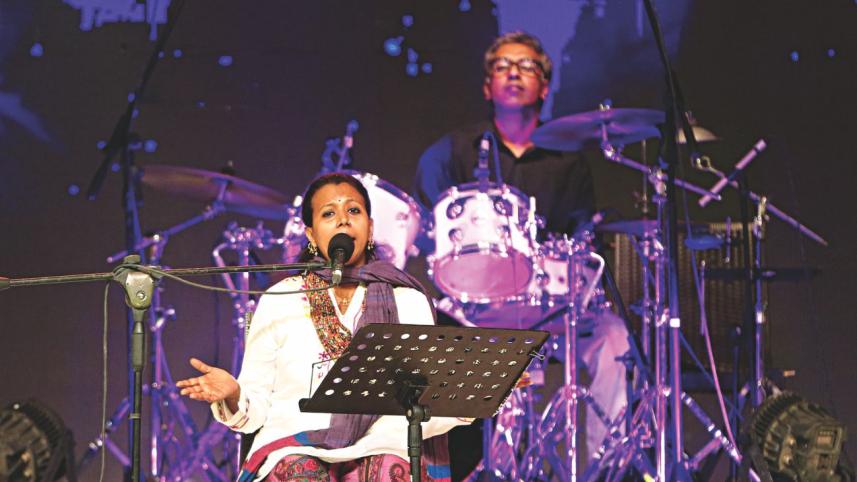Culture to cleanse the soul

“Militant and extremist activities cannot halt the flow of culture in our country; this evening in Sylhet stands testament to that,” Information Minister Hasanul Haq Inu summed up the power of culture and arts in one sentence during an impassioned address on the third evening of the Bengal Sangskriti Utshab Sylhet, as audiences swelled on the first weekend of the 10-day festival.
A ceremonial session began the evening proceedings at the main stage, the Hason Raja Mancha, where Bengal Foundation Chair Abul Khair, former Privatization Commission Chairman Inam Ahmed Chowdhury, Indian High commissioner Harshvardhan Shringla and Hasanul Haq Inu spoke.
“This kind of festivals should slowly spread to other parts of the country, and in a way, the entire Bangladesh has become a stage for Bengal Foundation,” said Inam Ahmed Chowdhury, hailing the initiative.
Inu, in his address, also said: “cultural activists never stumble because they speak from the pulse of the general people. Political activists sometimes make wrong steps because they don't understand the people. We urge the cultural activists and organisers – to cleanse our souls of the dust that settles on it.” He concluded by saying “We have to become good human beings. And that is why we need cultural festivals.”
Barnali Chatterjee was the first featured artiste of the night, performing Raga-based Bangla songs. Her set-list included Begum Akhter records “Phire Jao Bone Kalo Bulbul” and “Jochona Koreche Ari”, “Kholo Kholo Mondiro Dwar” (originally by Tarapada Chakraborty), and “Mohan BaNshi Baaje” (originally by Jatileshwar Mukherjee and popularised by Ajoy Chakravarty).
Jhuma Khandaker and Subir Nandi came on stage next. Jhuma Khandaker performed her set first, going the popular songs route – with “Gaaner Khatay Swaralipi Likhe”, “Tumi Cheyechhile Shudhu Jante”, “Sagorer Teer Theke”, “Osru Diye Lekha E Gaan”, and closing with a Hason Raja song “Ami Na Loilam Allah'r Naam”. Subir Nandi, a Sylhet local, took the audience on a musical journey with his illustrious repertoire of original songs “Amar E Du'ti Chokh Pathor Toh Noy”, “Shey Kotha Tumi Jodi Jante”, “Din Jaye Kotha Thake”, “Ami Brishti'r Kach Theke KaNdte Shikhechi”, a Sylheti folk song “Kare Dekhabo Moner Dukkho Go” (by Radharaman Dutta), an SD Burman song “Shono Go Dokhino Hawa”, and the ever-popular film track “Ekta Chhilo Shona'r Koinna”.
The Subir Chowdhury Art Camp, set up right next to the Hason Raja stage, also saw the visual artists taking the music in and letting it drive their artistic souls. Noted artists used their paint brushes and spray cans to express on canvas what the music made them feel.
Gaaner Dol O Krishnokoli was the final featured artiste of the day. “I have done the most number of shows in Sylhet,” Krishnokoli said, before breaking into her song “Boshekhete Rong Makhibi Ke Ke Aye”. She followed it up with her other original numbers “Hothat Ekta Roud Hoye Jao”, “Icchemoton” and an unreleased number “Ratridin Songiheen”. As her band-mate Arko Sumon broke into the sari gaan “Samal Samal Samal Ore Samne Tori Baiyo”, this correspondent had to head out to catch the bus back to Dhaka, but the music echoed on from the AMA Muhith Sports Complex, as it will continue to do so until March 3.



 For all latest news, follow The Daily Star's Google News channel.
For all latest news, follow The Daily Star's Google News channel.
Comments